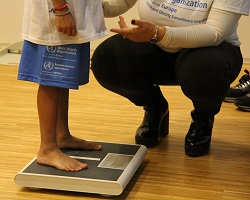Overweight or obesity affect 1 in 3 children in Croatia, new survey shows

WHO
The results of new research into childhood obesity in Croatia indicate that 35% of the country’s children aged 8–9 suffer from being overweight or obese. Nationally, results show the obesity problem is greater in boys, affecting 17.8% of boys compared to 11.9% of girls.
Childhood obesity poses a health risk throughout life, contributing to the development of many diseases such as type 2 diabetes, elevated blood pressure, cardiovascular diseases, musculoskeletal system diseases, asthma and others. Furthermore, children with obesity are often socially disadvantaged, have lower self-esteem, and are less successful at school.
The results of the Childhood Obesity Surveillance Initiative (COSI) - Croatia 2018/2019, were publicly presented at the Education Centre of the Croatian Institute of Public Health and live streamed on 4 March 2021.
A significant public health concern
Alarming rates of children with overweight and obesity are recorded throughout Europe and Croatia ranks high as 7th among the countries of Mediterranean Europe. The highest proportion of childhood overweight and obesity was observed in the Adriatic region where 36.9% of children had overweight or obesity.
“Compared to previous studies, we also observed an increase in overweight and obesity of 6% among girls in the Adriatic region, which is especially concerning and should inform public health policy in this area,” notes Prof Sanja Musić Milanović, MD, MPH, PhD, and Head of Health Promotion Division of the Croatian Institute of Public Health, who led the research.
Obesity is an important modifiable health risk for developing chronic noncommunicable diseases (NCDs), which affect and cause over 90% of deaths in the country. The fact that 1 in 3 children in Croatia have overweight or obesity is a significant public health concern and these results will be used to assist the planning of further health promotion activities among school children in Croatia.
Nutrition, lifestyle habits and diet surveyed
Although all school children in Croatia undergo regular physical exams, the data on their nutritional status, physical activity and dietary habits are not collected in a standardized way. Therefore, in 2015–2016 Croatia joined the Childhood Obesity Surveillance Initiative (COSI) of WHO/Europe, titled Childhood Obesity Surveillance Initiative, Croatia (CroCOSI).
The main goal of the CroCOSI research is the regular collection of comparable data on the nutritional status of school children and their families’ lifestyle habits, and characteristics of environments in the schools they attend. Data are collected for children aged 8.0–8.9 years.
By joining COSI, Croatia has joined a European movement which continuously monitors the nutritional status of children in a methodologically concordant manner, which enables inter-country comparison and contributes to raising awareness of the growing rates of obesity and related problems in Croatia and all of the states involved.



